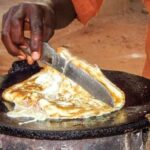Rumour has it that some Ivorians can eat attieke morning, afternoon and night.
The fermented cassava meal has long been a marker of national identity in Ivory Coast, beloved across all levels of society in the West African nation. And now, the United Nations has secured attieke’s status as one of the region’s most important servings.
In December, UNESCO (the United Nations Education, Scientific, and Cultural Organisation) recognised attieke’s icon status by listing the dish as an intangible cultural heritage. That move elevates the tangy meal to the status of other globally renowned culinary favourites like South Korean kimchi and Mexican tacos.
For Ivorian women who’ve prepared the dish in vast amounts for sale, and who have passed down the intensive cooking skill over generations, attieke is also a way to bond and a path to financial freedom.
Pronounced “at-chie-kay”, the meal is sometimes called Ivorian couscous and has been marketed by some as a gluten-free alternative to regular couscous.
Now, with the UNESCO recognition, its branding could receive a new boost. But what are the origins of attieke, why do Ivorians love it so much, and how does one prepare the dish?
Why was attieke recognised?
A UNESCO panel added tangy attieke to the organisation’s list of intangible cultural heritage on December 5 at the body’s 19th session on safeguarding non-physical heritage in Asuncion, Paraguay. The list highlights culturally significant practices, knowledge, or expressions that are particular to a region or country.
Alongside the Ivorian dish, UNESCO recognised 10 other cultural meals or drinks, including Japanese sake, a traditional rice wine; and Caribbean cassava bread eaten by Indigenous communities.
In considering attieke, UNESCO noted the skills related to its production. “The knowledge and skills are passed down orally and through observation within families … The related knowledge and skills play an important role in the social life of communities,” it said.
Attieke’s intense, multiple-day preparation methods have been passed down over generations in Ivory Coast as women often organise themselves into local production businesses and produce it in big batches.
Ramata Ly-Bakayoko, Ivory Coast’s delegate to UNESCO, said at the session in Paraguay that the meal was based on “precise gestures and traditional techniques that have lasted for centuries” and that it is “deeply rooted” in life and culture.
What’s attieke’s origin and its traditional significance?
Attieke is an accessible and affordable dish that has become a staple in family meals, UNESCO noted. It is also often served at weddings, birthdays, or other events, with a side of spicy pepper sauce, grilled or fried tilapia fish, and chopped onions.
The dish is typically prepared by women in the southern lagoon parts of the Ivory Coast, especially from the Adioukrou, Avikam and Ebrie groups. In fact, the name stemmed from the Ebrie term for the meal: “adjeke”.
In more recent decades, production has spread across the country, and demand for attieke is growing in neighbouring countries like Burkina Faso, Ghana and in African diasporas across Europe and North America.
Producers are increasingly exporting a pre-cooked form of the meal that can be easily prepared at home. Countries like Burkina Faso are also seeing attieke producers.
How is attieke made?
The steaming fermented cassava pulp often takes three to five days to make from scratch.
Usually, groups of women gather to make the meal in huge batches and then portion and sell it to market vendors in small plastic bags.
Magnan, a days-long fermentation process, gives attieke its distinctive twinge. Here’s how the meal is made traditionally (plus easy alternatives for single-home cooking):
- First, slightly boiled or braised cassava roots are soaked for one to three days to ferment and act as yeast in the final product.
- Then, more fresh roots are peeled, cut, and washed. Together with the fermented roots, some overheated palm oil, and some water, the mixture is then crushed in a grinder. The ice crush option on a home-use blender would achieve similar results.
- Afterwards, the pulp is portioned into plastic bags and left for about 12 to 15 hours to ferment further.
- Next, the fermented paste is thoroughly squeezed to get the water out. Typically, Ivorian women prepare the meal in batches using an industrial press. For home use, placing the paste in a sieve cloth or bag, putting a flat board on it, and then placing heavy objects like stones on it for hours could achieve similar results.
- Then, the drying paste is sieved, usually with a 5mm sieve to get out the chaff. Ivorian women then use their hands to fluff up the paste so granules form better.
- The dried paste is thereafter spread out in thin layers on tarps and laid out in the sun to dry. That process takes about half an hour or more, depending on the weather. At home, an oven would do the job.
- Again, the now fully-dried granules are sieved and fluffed to remove any fibres or other material.
- Next, the granules are steamed – rather than cooked – in traditional pots designed to hold hot water beneath the dried attieke. At home, a metal sieve lined with some cloth and placed inside a pot with hot water could do. Steaming takes 30 to 40 minutes.
- Finally, the finished product, soft and fluffy in consistency, is typically packed into small plastic bags for sale in markets.
What are the controversies surrounding attieke?
Many Ivorians are passionately territorial about attieke. Some see increasing levels of production in neighbouring countries as a threat to national identity.
In 2019, there was outrage on Ivorian social media platforms after a Burkinabe chef and entrepreneur, Florence Bassono, founder of Faso Attieke, won an award at an agricultural and animal resources fair in Abidjan. Many Ivorians were angered that a non-Ivorian national won the competition over local entrepreneurs.
In December, following UNESCO’s recognition of the meal, locals told a Radio France International (RFI) reporter that the global recognition was important and would help Ivorian attieke stand out.
“We often hear that Burkina Faso is first or China is first in attieke production, and we who created attieke are last,” one local in Abidjan’s Anono suburb told the reporter.
In 2019, the Ivorian government began a bid to trademark the name, “Attieke des Lagunes” or “Attieke of the Lagoons”, and its intensive preparation methods, in order to protect its authenticity.
In mid-2023, the African Intellectual Property Organisation (OAPI), which includes 17 French-speaking African nations, certified Ivorian attieke and its production methods by granting it PGI or “Protected Geographical Indication” status. That label highlights attieke’s special cultural link to Ivory Coast and distinguishes it from products made in other countries.
What other African dishes have UNESCO heritage status?
With its new status, attieke joins the Senegalese rice dish, thiebou dieune – the only other sub-Saharan African dish recognised with the UNESCO honour.
Originating from the northern city of Saint Louis, the meal, pronounced chee-buu-jen, is prepared with fish and vegetables and is often eaten for lunch or dinner. In the dominant Wolof language, it literally means “rice and fish”.
UNESCO recognised the dish in 2021, along with the rumba dance from the Democratic Republic of the Congo (DRC). Kenya’s Isikuti dance was also inscribed on the list in 2021.
Email Us on editorial@nnafrica.com












